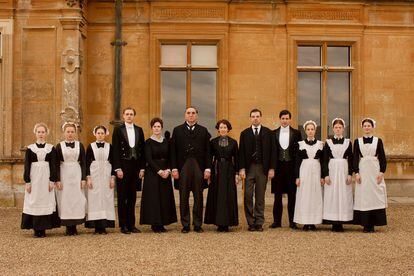In 1879, shortly after starting work at the age of 10 as a servant in a mansion in a suburb of London, Harriet Brown wrote in a letter to her mother: “I get up at half past five or six in the morning and I don't go to bed until close to twelve at night and sometimes I'm so tired that I have no choice but to cry.
If it wasn't for the cod liver oil I'm taking, I think I would have been bedridden."
Two decades later, history would repeat itself with her daughter Ellen, who at the same age became the eighth of eight maids in another house in the British capital.
As a newcomer, she was given the toughest tasks.
She had to brush wooden floors with a mixture of liquid soap and silica dust that left her hands and forearms raw.
More information
'Downton Abbey: a new era': more nice but inane continuations of the television series
The story of Harriet and Ellen appears in the book
Never in front of the servants,
by Frank Victor Dawes, a British journalist now deceased, who in 1972 published an advertisement in
The
Daily Telegraph
in which he asked people who had worked as servants that they send him letters in which they recounted their experiences.
The Periférico publishing house is now publishing it for the first time in Spanish with a translation by Ángeles de los Santos.
Its release coincides with the release of the second film sequel to the popular
Downton Abbey series
,
a British television production, released in 2010, which recreates in an idealized way the daily life of a Victorian family and their servants, along the lines of its predecessor in the seventies,
Up and Down.
In neither of the two can you see
the crudeness reflected in the testimonies compiled by Dawes.
Everything seems to be where it has to be, both objects and people: everyone happy in their rightful place.
Nothing to do, for example, with the experience of Elizabeth Simpson, born in 1853, who also began working as a maid at the age of 10 in a mansion in the county of Yorkshire.
As her granddaughter told Dawes, she had to get up at four to scrub the stone floors of the dairy with cold water and churn butter until her arms ached.
At those early hours she lit up with a candle that she was pushing as she advanced on her knees through the paving.
They had her working nonstop all day.
It was a strict rule that she was never seen by any member of the family.
If by some misfortune they saw her, she was not to speak to them, but bow to them and disappear as soon as possible.
When he published that advertisement, Dawes intended to tell the true story of domestic workers in the United Kingdom from the splendor of the sector in the mid-nineteenth century to its progressive decline after World War I.
The son of a maid who began to serve at the age of 13, the journalist intended to investigate the reasons for this decline: from the million and a half people that there were until the beginning of the war, it had gone to less than 100,000 in the seventies.
He received about 700 letters in a few months, which served as the basis for writing his book
About Him, which
became a
best seller
when it was published in 1973, at the height of
Up and Down.
Five maids pose in a Buckinghamshire country house, in a photo dated between 1896 and 1920.Alfred Newton &
Sons (Historic England Archive/Heritag)
From the first pages of the book it is clear that the servants of Victorian houses lived in conditions close to slavery.
They barely had a few free hours a week, they could be fired on a whim and they rested in infamous rooms.
Violet Turner, who worked in a boarding house shortly before World War I, recalls having to sleep in the bathroom on a folding bed: “When I got up in the morning I had to fold the bed up and roll it out on the landing before I got up. the guests will take their bath”.
And worst of all, neither the masters nor the servants were aware of it, because both parties assumed that their position in life responded to an order dictated by the divinity.
"The Bible was used to convince them to recognize the superiority of those they served," explains Dawes.
Epistle to the Ephesians
: "Servants, obey those who are your masters in the world, with fear and trembling (...) fulfilling the will of God from the heart."
Thus, submission to the system was ensured.
The servants of the series 'Downton Abbey', in a scene outside the mansion where they work.
The bosses, for their part, lived with a clear conscience because socially the servants were considered “different” beings, when not “inferior”.
That helped to morally justify child exploitation and sexual abuse.
“As for the servants and women of lower classes […] they all fornicated in secret and were proud to have a gentleman to cover them.
That was the opinion of men of my lifestyle and my age”, relates a Victorian gentleman in his memoirs, which he published anonymously in 1890 under the title
My Secret Life.
“If, as was too often the case, a young servant girl became pregnant by a member of the family, the blame fell squarely on her, not on him,” says Dawes.
Many times he fired them without references, which led them to asylums or prostitution.
This awareness that the servants were "inferior" also explains why the movement for the rights of the working classes ignored them until well into the twentieth century.
And that it met with greater resistance when it began to set.
“I consider that any possibility of introducing into domestic service the kind of relationship that now exists between employers and workers in the industrial field could have a disastrous influence on the foundations of home life,” the Marchioness of Londonderry wrote in a letter in the twenties to express their opposition to the regulation of domestic work.
It took another decade for her demands for minimum wages and breaks to be recognized,
Partly because the need for female labor in factories during World War I meant that many women found they could get better jobs: the wages might not be higher, but at least they weren't treated like slaves.
And the shortage of maids began to be a real problem in the country.
It was the beginning of the decline of the golden age of servants in the UK.
And with it, the collapse of a way of life in which a family's social position was measured by the number of servants it had.
He was accurately portrayed in 1989 by Nobel laureate Kazuo Ishiguro in his novel
The Remains of the Day
,
adapted for film in 1993 by James Ivory, starring Anthony Hopkins and Emma Thomson.
However, certain stigmas and grievances associated with domestic work persist not only in that country, but throughout the world.
“In English,
maid
is a refined word, evoking tea services, starched uniforms and the
Downton Abbey series.
But in real life, the world of domestic workers is encrusted with dirt and scraps of shit.
These women clean our drains of pubic hair, they are silent witnesses to our dirty laundry, literally and metaphorically.
However, they are relegated to invisibility”, writes the American activist Barbara Ehrenreich in the prologue of the book
Maid,
in which Stephanie Land narrates her hard years of work as a cleaner with a young daughter in charge, who became a
best seller
in the US after its publication in 2020 and that inspired the series
La assistant.
The Spanish edition (Capitán Swing, 2021) includes a preface by the Dominican Rafaela Pimentel, one of the leaders of the union movement of domestic workers in Spain, where it must be remembered that they still do not have the right to collect unemployment benefits. : “Most people look at [Stephanie Land], at us, with looks that recriminate us for being poor (…) Looks, among other things, that tell us that we are not 'normal' women, as society dictates ”.
Last Friday it was learned that two months ago an 86-year-old woman who had been enslaved for seven decades working as a maid for three generations of a family without receiving a salary or having vacations was rescued in Brazil.
When she was found, in a house in Rio de Janeiro, she was sleeping on a sofa at the door of the room of the landlady she cared for, also in her eighties.









